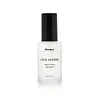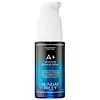What's inside
What's inside
 Key Ingredients
Key Ingredients

 Benefits
Benefits

 Concerns
Concerns

 Ingredients Side-by-side
Ingredients Side-by-side

Water
Skin ConditioningMethylpropanediol
SolventGlycerin
Humectant1,2-Hexanediol
Skin ConditioningCaprylic/Capric Triglyceride
MaskingNiacinamide
SmoothingDioscorea Japonica Root Extract
Skin ConditioningPolysilicone-11
Raffinose
Skin ConditioningSaccharomyces Ferment Filtrate
HumectantXanthan Gum
EmulsifyingCentella Asiatica Extract
CleansingFicus Carica Fruit Extract
HumectantDiphenyl Dimethicone
EmollientTriethylhexanoin
MaskingMadecassoside
AntioxidantPolyquaternium-51
Skin ConditioningAloe Barbadensis Leaf Water
MaskingEthylhexylglycerin
Skin ConditioningParfum
MaskingOryza Sativa Extract
AbsorbentPiper Methysticum Leaf/Root/Stem Extract
Skin ConditioningAlgae Extract
EmollientEclipta Prostrata Leaf Extract
Skin ConditioningPanax Ginseng Berry Extract
Skin ConditioningMonascus Extract
Skin ConditioningGlycosyl Trehalose
Emulsion StabilisingHydrogenated Starch Hydrolysate
HumectantAdenosine
Skin ConditioningBiosaccharide Gum-1
HumectantPolyglyceryl-10 Myristate
Skin ConditioningHydrogenated Lecithin
EmulsifyingDisodium EDTA
Laureth-12
EmulsifyingLecithin
EmollientSodium Hyaluronate
HumectantDipropylene Glycol
HumectantArgania Spinosa Kernel Oil
EmollientCamellia Japonica Seed Oil
EmollientCamellia Sinensis Seed Oil
HumectantHelianthus Annuus Seed Oil
EmollientMacadamia Integrifolia Seed Oil
Skin ConditioningOlea Europaea Fruit Oil
MaskingSimmondsia Chinensis Seed Oil
EmollientBeta-Glucan
Skin ConditioningButyrospermum Parkii Butter
Skin ConditioningTocopherol
AntioxidantCeramide NP
Skin ConditioningFructooligosaccharides
HumectantPropylene Glycol
HumectantHydrolyzed Hyaluronic Acid
HumectantHydrogenated Phosphatidylcholine
EmulsifyingRetinol
Skin ConditioningCholesterol
EmollientCetyl Alcohol
EmollientStearyl Alcohol
EmollientCarbomer
Emulsion StabilisingAmmonium Acryloyldimethyltaurate/Vp Copolymer
Tromethamine
BufferingWater, Methylpropanediol, Glycerin, 1,2-Hexanediol, Caprylic/Capric Triglyceride, Niacinamide, Dioscorea Japonica Root Extract, Polysilicone-11, Raffinose, Saccharomyces Ferment Filtrate, Xanthan Gum, Centella Asiatica Extract, Ficus Carica Fruit Extract, Diphenyl Dimethicone, Triethylhexanoin, Madecassoside, Polyquaternium-51, Aloe Barbadensis Leaf Water, Ethylhexylglycerin, Parfum, Oryza Sativa Extract, Piper Methysticum Leaf/Root/Stem Extract, Algae Extract, Eclipta Prostrata Leaf Extract, Panax Ginseng Berry Extract, Monascus Extract, Glycosyl Trehalose, Hydrogenated Starch Hydrolysate, Adenosine, Biosaccharide Gum-1, Polyglyceryl-10 Myristate, Hydrogenated Lecithin, Disodium EDTA, Laureth-12, Lecithin, Sodium Hyaluronate, Dipropylene Glycol, Argania Spinosa Kernel Oil, Camellia Japonica Seed Oil, Camellia Sinensis Seed Oil, Helianthus Annuus Seed Oil, Macadamia Integrifolia Seed Oil, Olea Europaea Fruit Oil, Simmondsia Chinensis Seed Oil, Beta-Glucan, Butyrospermum Parkii Butter, Tocopherol, Ceramide NP, Fructooligosaccharides, Propylene Glycol, Hydrolyzed Hyaluronic Acid, Hydrogenated Phosphatidylcholine, Retinol, Cholesterol, Cetyl Alcohol, Stearyl Alcohol, Carbomer, Ammonium Acryloyldimethyltaurate/Vp Copolymer, Tromethamine
Water
Skin ConditioningPropanediol
SolventDimethyl Isosorbide
SolventTriheptanoin
Skin ConditioningDimethicone
EmollientGlycerin
HumectantPentylene Glycol
Skin ConditioningHexyldecanol
EmollientDisiloxane
Skin ConditioningCetyl PEG/PPG-10/1 Dimethicone
EmulsifyingDiheptyl Succinate
EmollientPropylene Carbonate
SolventHydroxypinacolone Retinoate
Skin ConditioningPPG-24-Glycereth-24
EmulsifyingPhenyl Trimethicone
Skin ConditioningRetinol
Skin ConditioningUbiquinone
AntioxidantHoney Extract
HumectantSodium Hyaluronate Crosspolymer
HumectantAlgae Extract
EmollientZingiber Officinale Extract
Skin ConditioningOpuntia Ficus-Indica Fruit Extract
Skin ConditioningBisabolol
MaskingButyrospermum Parkii Butter
Skin ConditioningPhospholipids
Skin ConditioningSaccharomyces Cerevisiae Extract
Skin ConditioningLecithin
EmollientSodium Acrylates Copolymer
Hydrogenated Polyisobutene
Emollient1,2-Hexanediol
Skin Conditioning4-T-Butylcyclohexanol
MaskingPolyglyceryl-10 Stearate
Skin ConditioningCaprylyl Glycol
EmollientHelianthus Annuus Seed Oil
EmollientSorbitol
HumectantCetylhydroxyproline Palmitamide
Skin ConditioningPolysilicone-11
Benzoic Acid
MaskingDehydroacetic Acid
PreservativeSodium Phytate
Glyceryl Polyacrylate
Polysorbate 80
EmulsifyingHydroxyphenyl Propamidobenzoic Acid
Skin ConditioningStearic Acid
CleansingBrassica Campestris Sterols
EmollientPvp
Emulsion StabilisingCapryloyl Glycerin/Sebacic Acid Copolymer
Skin ConditioningSodium Benzoate
MaskingAlcohol
AntimicrobialPotassium Phosphate
BufferingDecyl Glucoside
CleansingPhenoxyethanol
PreservativeHexylene Glycol
EmulsifyingPotassium Sorbate
PreservativeTocopherol
AntioxidantWater, Propanediol, Dimethyl Isosorbide, Triheptanoin, Dimethicone, Glycerin, Pentylene Glycol, Hexyldecanol, Disiloxane, Cetyl PEG/PPG-10/1 Dimethicone, Diheptyl Succinate, Propylene Carbonate, Hydroxypinacolone Retinoate, PPG-24-Glycereth-24, Phenyl Trimethicone, Retinol, Ubiquinone, Honey Extract, Sodium Hyaluronate Crosspolymer, Algae Extract, Zingiber Officinale Extract, Opuntia Ficus-Indica Fruit Extract, Bisabolol, Butyrospermum Parkii Butter, Phospholipids, Saccharomyces Cerevisiae Extract, Lecithin, Sodium Acrylates Copolymer, Hydrogenated Polyisobutene, 1,2-Hexanediol, 4-T-Butylcyclohexanol, Polyglyceryl-10 Stearate, Caprylyl Glycol, Helianthus Annuus Seed Oil, Sorbitol, Cetylhydroxyproline Palmitamide, Polysilicone-11, Benzoic Acid, Dehydroacetic Acid, Sodium Phytate, Glyceryl Polyacrylate, Polysorbate 80, Hydroxyphenyl Propamidobenzoic Acid, Stearic Acid, Brassica Campestris Sterols, Pvp, Capryloyl Glycerin/Sebacic Acid Copolymer, Sodium Benzoate, Alcohol, Potassium Phosphate, Decyl Glucoside, Phenoxyethanol, Hexylene Glycol, Potassium Sorbate, Tocopherol
 Reviews
Reviews

Ingredients Explained
These ingredients are found in both products.
Ingredients higher up in an ingredient list are typically present in a larger amount.
1,2-Hexanediol is a synthetic liquid and another multi-functional powerhouse.
It is a:
- Humectant, drawing moisture into the skin
- Emollient, helping to soften skin
- Solvent, dispersing and stabilizing formulas
- Preservative booster, enhancing the antimicrobial activity of other preservatives
Algae Extract is a confusing name. This is because algae is an informal term for a group of 30,000 aquatic organisms that can photosynthesize.
The term 'algae extract' can refer to any one, or a blend of, the 30,000 types.
Algae is rich in antioxidants. Antioxidants help fight free-radicals. Free-radicals are molecules that may damage your skin cells, such as pollution.
Algae can also help with soothing and hydrating skin.
Many different types of algae have different benefits.
Learn more about Algae ExtractThis ingredient is also known as shea butter. It is an effective skin hydrator and emollient.
Emollients help soothe and soften your skin. It does this by creating a protective film on your skin. This barrier helps trap moisture and keeps your skin hydrated. Emollients may be effective at treating dry or itchy skin.
Shea butter is rich in antioxidants. Antioxidants help fight free-radicals, or molecules that may harm the body. It is also full of fatty acids including stearic acid and linoleic acid. These acids help replenish the skin and keep skin moisturized.
While Shea Butter has an SPF rating of about 3-4, it is not a sunscreen replacement.
Shea butter may not be fungal acne safe. We recommend speaking with a professional if you have any concerns.
Learn more about Butyrospermum Parkii ButterGlycerin is already naturally found in your skin. It helps moisturize and protect your skin.
A study from 2016 found glycerin to be more effective as a humectant than AHAs and hyaluronic acid.
As a humectant, it helps the skin stay hydrated by pulling moisture to your skin. The low molecular weight of glycerin allows it to pull moisture into the deeper layers of your skin.
Hydrated skin improves your skin barrier; Your skin barrier helps protect against irritants and bacteria.
Glycerin has also been found to have antimicrobial and antiviral properties. Due to these properties, glycerin is often used in wound and burn treatments.
In cosmetics, glycerin is usually derived from plants such as soybean or palm. However, it can also be sourced from animals, such as tallow or animal fat.
This ingredient is organic, colorless, odorless, and non-toxic.
Glycerin is the name for this ingredient in American English. British English uses Glycerol/Glycerine.
Learn more about GlycerinHelianthus Annuus Seed Oil is the oil derived from the seeds of a Sunflower. Sunflower seed oil is non-fragrant. It is an emollient, meaning it helps to soften the skin.
Sunflower seed oil contains many fatty acids. The fatty acids found in sunflower seeds include (from highest amount to least): linoleic acid, myristic acid, palmitic acid, stearic acid, arachidic acid, oleic acid, and linolenic acid.
These fatty acids help the skin create ceramides. Ceramides play a role in repairing the skin barrier.
Helianthus Annuus Seed Oil helps moisturize the skin. This in turn helps the skin look more rejuvenated and smoother.
Sunflowers are rich in vitamin E.
Historians believe Indigenous cultures of North America domesticated sunflowers before corn. Thus they relied on sunflower oil for a variety of uses. One such use is moisturizing skin and hair.
Sunflower seed oil may not be fungal acne safe. We recommend speaking with a professional if you have any concerns.
Learn more about Helianthus Annuus Seed OilLecithin is a term for a group of substances found in the cell membranes of plants, animals, and humans. They are made up of mixture of phospholipids.
This ingredient has emollient and emulsifying properties.
As an emollient, lecithen helps soften the skin and creates a barrier to keep moisture in.
As an emulsifier, it also helps prevent water and oil ingredients from separating. Lecithin can also help ingredients be better absorbed by the skin.
This is because the phospholipids in lecithin produce liposomes. Liposomes help other ingredients get through the skin barrier.
Depending on the source of this ingredient, lecithin may not be fungal acne safe. This is because some sources of lecithin come from soybean oil, which may feed the malassezia yeast that feeds fungal acne.
We recommend reaching out to the brand you are purchasing from to inquire about the source of their lecithin.
Some other names for this ingredient include soy lecithin and deoiled soy lecithin.
Learn more about LecithinPolysilicone-11 is a film-forming silicone that creates a non-tacky and matte finish on the skin. It's commonly used to improve texture, absorb excess oil, and help active ingredients spread evenly.
Due to its "rubber-like" structure, it stays on the skin's surface instead of being absorbed. On the skin, it creates a flexible layer that enhances wearability and stability.
Retinol is a gold-standard ingredient for anti-aging. It is a form of Vitamin A and belongs to the class of retinoids that also includes tretinoin.
Why is retinol famous?
It has the most scientific studies backing up its skin benefits out of all the non-prescription ingredients.
Retinol is proven to:
This is why retinol is effective at removing wrinkles, fading dark spots, treating acne, and reducing the appearance of pores.
Studies show retinol is less effective when exposed to UV. Be sure to look for appropriate packaging to keep your retinol potent (similar to Vitamin C).
Using retinol or any retinoids will increase sun-sensitivity in the first few months. Though studies show retinoids increase your skin's natural SPF with continuous use, it is best to always wear sunscreen and sun-protection.
We recommend speaking with a medical professional about using this ingredient during pregnancy.
Retinol may cause irritation in some people, so be sure to patch test. Experts recommend 'ramping up' retinol use: start using this ingredient once a week and work up to using it daily.
Read about Tretinoin
Learn more about RetinolTocopherol (also known as Vitamin E) is a common antioxidant used to help protect the skin from free-radicals and strengthen the skin barrier. It's also fat soluble - this means our skin is great at absorbing it.
Vitamin E also helps keep your natural skin lipids healthy. Your lipid skin barrier naturally consists of lipids, ceramides, and fatty acids. Vitamin E offers extra protection for your skin’s lipid barrier, keeping your skin healthy and nourished.
Another benefit is a bit of UV protection. Vitamin E helps reduce the damage caused by UVB rays. (It should not replace your sunscreen). Combining it with Vitamin C can decrease sunburned cells and hyperpigmentation after UV exposure.
You might have noticed Vitamin E + C often paired together. This is because it is great at stabilizing Vitamin C. Using the two together helps increase the effectiveness of both ingredients.
There are often claims that Vitamin E can reduce/prevent scarring, but these claims haven't been confirmed by scientific research.
Learn more about TocopherolWater. It's the most common cosmetic ingredient of all. You'll usually see it at the top of ingredient lists, meaning that it makes up the largest part of the product.
So why is it so popular? Water most often acts as a solvent - this means that it helps dissolve other ingredients into the formulation.
You'll also recognize water as that liquid we all need to stay alive. If you see this, drink a glass of water. Stay hydrated!
Learn more about Water